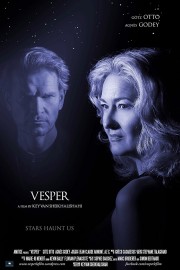Vesper (Short)
It’s interesting that I ended up choosing to watch Keyvan Sheikhalishahi’s short film, “Vesper,” the morning after watching Christopher Nolan’s latest film, because it has many similarities to Nolan’s second film, “Memento.” At the heart of both films is the notion of memories being remembered in a specific way so that the central character has a comfortable answer compared to the truth. With “Memento,” the issue includes an inability to remember correctly due to short-term memory, while in “Vesper,” it appears that the main character, Marge (Agnès Godey), has conveniently rewritten the truth so that she is a victim. Even at the end of the film, we are not entirely certain what the truth is, but with Marge’s seemingly abusive and manipulative ex-husband, Walter (Götz Otto), looking on, we are left wondering whether she continues to be trapped in her own psychological cage.
The film begins with Marge getting out of bed. Walter is looking on, and she tells him that he shouldn’t be here. She goes into the downstairs living room, and closes the door behind her as she talks to her nephew, Christian (writer-director Sheikhalishahi), whom she has told about her feeling that Walter is stalking her. He cannot see Walter in the house, but gets her to agree to him meeting Walter on the beach the next day. More pieces to the puzzle are laid out- letters from Walter, presents from Christian in the form of pictures of stars, Walter taking Christian’s car and leaving him at the beach, and another late-night meeting between Marge and Walter than throws a wrench into everything we thought we knew up until then.
This is an impressive film for the 18-year-old Sheikhalishahi to have made, with a tone and style that has definitely been accomplished from a cinematic standpoint that will draw in more adventurous moviegoers and watchers. If you are a fan of Christopher Nolan or David Lynch, whose films definitely feel like an influence, as well, I would especially recommend seeking this film out, as it has much to appreciate. That being said, the screenplay by Sheikhalishahi feels too vague in its conclusion, and a bit too confused as to what the story actually is (it doesn’t really make a lot of sense, in the end), to be on-par with the best those two masters have to offer. That being said, it’s clear that Sheikhalishahi has a great deal of passion and imagination as a filmmaker, and for some so young to be able to make a film worthy of comparison to those filmmakers says a great deal about what he has to offer. I look forward to seeing what else he has in him down the line.










